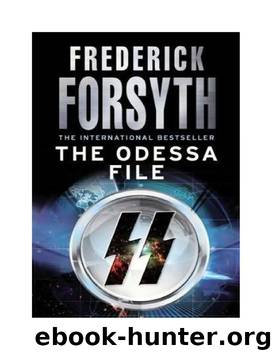Frederick Forsyth - 1972 - The Odessa File by Frederick Forsyth

Author:Frederick Forsyth [Forsyth, Frederick]
Language: eng
Format: epub
Published: 0101-01-01T00:00:00+00:00
“Very few Germans have,” conceded Wiesenthal. “In fact, very few people know much about the Odessa at all. The word is hardly ever mentioned in Germany and just as certain members of the American underworld will stoutly deny the existence of the Mafia, so any former member of the SS will deny the existence of the Odessa. To be perfectly frank, the term is not used as much nowadays as formerly. The new word is ‘the Comradeship,’ just as the Mafia in America is called Cosa Nostra. But what’s in a name? The Odessa is still there, and will be while there is an SS criminal to protect.”
“And you think these are the men I’m up against?” asked Miller.
“I’m sure of it. The warning you were given in Bad Godesberg could not have come from anyone else. Do be careful; these men can be dangerous.”
Miller’s mind was on something else. “When Roschmann disappeared, after his wife had given away his new name, you said he would need a fresh passport?”
“Certainly.”
“Why the passport particularly?” Simon Wiesenthal leaned back in his chair and nodded. “I can understand why you are puzzled. Let me explain. After the war in Germany, and here in Austria, there were tens of thousands wandering about with no identification papers. Some had genuinely lost them; others had thrown them away for good reason.
“To obtain new ones, it would normally be necessary to produce a birth certificate. But millions had fled from the former German territories overrun by the Russians. Who was to say if a man was, or was not, born in a small village in East Prussia, now miles behind the Iron Curtain? In other cases the buildings in which the certificates were stored had been destroyed by bombing.
“So the process was very simple. All one needed were two witnesses to swear that one was who one said, and a fresh personal ID card was issued.
In the case of prisoners-of-war, they often had no papers either. On their release from camp, the British and American camp authorities would sign a release paper to the effect that Corporal Johann Schumann was certified as released from prisoner camp. These papers were then taken by the soldier to the civilian authorities, who issued an ID card in the same name. But often the man had only told the Allies his name was Johann Schumann. It could have been something else. No one checked.
And so he got a new identity.
“That was all right in the immediate aftermath of the war, which was when most of the SS criminals were getting their new identities. But what happens to a man who is blown wide open in 1955, as was Roschmann? He can’t go to the authorities and say he lost his papers during the war.
They would be bound to ask bow he had got by during the ten-year interim period. So he needs a passport.”
“I understand so far,” said Miller. “But why a passport? Why not a driving license or an ID
Download
This site does not store any files on its server. We only index and link to content provided by other sites. Please contact the content providers to delete copyright contents if any and email us, we'll remove relevant links or contents immediately.
| Assassinations | Conspiracies |
| Espionage | Political |
| Terrorism |
The Wolf Sea (The Oathsworn Series, Book 2) by Low Robert(35233)
Crowbone (The Oathsworn Series, Book 5) by Low Robert(33602)
The Daughters of Foxcote Manor by Eve Chase(23608)
The Silent Patient by Alex Michaelides(19713)
The Secret History by Donna Tartt(19048)
Shot Through The Heart (Supernature Book 1) by Edwin James(18908)
All the Missing Girls by Megan Miranda(15946)
Ready Player One by Cline Ernest(14639)
The Betrayed by Graham Heather(12815)
The Betrayed by David Hosp(12769)
Red by Erica Spindler(12561)
Bull's Eye Sniper Chronicles Collection (The Second Cycle of the Betrayed Series) by McCray Carolyn(12364)
Kathy Andrews Collection by Kathy Andrews(11812)
Warriors (9781101621189) by Young Tom(10836)
Invisible Girl by Lisa Jewell(10495)
The Last by Hanna Jameson(10246)
Year One by Nora Roberts(9783)
Mindhunter: Inside the FBI's Elite Serial Crime Unit by John E. Douglas & Mark Olshaker(9318)
Tell Tale: Stories by Jeffrey Archer(9030)
